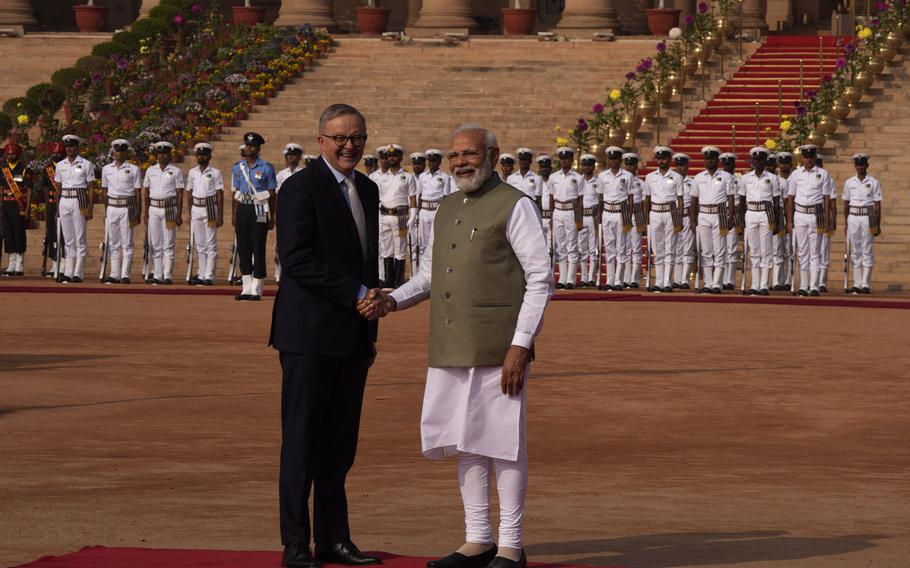
Indian Prime Minister Narendra Modi welcomes his Australian counterpart Anthony Albanese during laters's ceremonial reception at the Indian presidential palace, in New Delhi, India, Friday, March 10, 2023. Australia is striving to strengthen security cooperation with India and also deepen economic and cultural ties, Prime Minister Anthony Albanese said on Friday. (Manish Swarup/AP)
NEW DELHI — Australia wants to strengthen security cooperation with India while also deepening economic and cultural ties, Prime Minister Anthony Albanese said Friday ahead of talks with Indian Prime Minister Narendra Modi.
"We are partners and building that partnership even stronger each and every day,'' Albanese told reporters after a ceremonial reception at the Indian president's palace in New Delhi.
Both countries are working to strengthen the Quad, an alliance of Australia, India, Japan and the United States that aims to counter China's rising influence in Asia.
At a media briefing on Friday, Albanese was asked to explain his country's position toward China after he described India as a "top-tier security partner."
"We need to ensure that Australia's defense assets are the best they can be, and that we build our capability. At the same time, we need to build relationships. That's what I've been doing. I've been doing that here in India, we're doing that throughout the Indo-Pacific. We've ... improved our relationship with China in recent times as well," he said.
The Indian Ocean is central to both countries' security and prosperity, Albanese said in a tweet on Thursday, adding that "we are working together to ensure the Indo-Pacific is open, inclusive, and prosperous."
Albanese was also asked Friday about the recent raid by India's tax officials on the BBC offices in New Delhi and Mumbai after the BBC aired a documentary that was critical of Modi.
"Australia stands up for press freedom. But India is a great democracy, and to dismiss that is, I think, wrong. ... Where there are differences or issues to be raised, we raise them privately and appropriately," he said.
On Thursday, Albanese briefly watched a cricket test match between Indian and Australian teams in Ahmedabad in Modi's home state of Gujarat.
Albanese also met Indian business leaders in Mumbai, India's financial and entertainment capital, and visited India's homemade aircraft carrier INS Vikrant, which was commissioned in the Indian navy in September.
He told the business leaders that now could be a turning point in accelerating economic co-cooperation and mutual benefits in the relationship between the two countries.
Albanese, who is accompanied by a delegation of business leaders, said earlier this week that India, along with Indonesia, would grow to be the third- and fourth-largest economies in the world, which presented "an incredible opportunity" for Australia.
A bilateral trade agreement that came into force in December last year is expected to vastly tap the trade potential between the two countries as 96% of Indian goods exports can now enter Australia duty-free. Likewise, 85% of Australian goods exports can enter India duty-free.
In the 2022 fiscal year, India was Australia's ninth-largest trading partner and they hope to double trade in the next five years.
India's exports to Australia totaled $8.3 billion and imports from the country stood at $16.7 billion in 2021-22, according to the economic think tank Global Trade Research Initiative.
While India's exports range from agriculture, garments and railway engines to telecom, 95% of India's imports from Australia are raw materials and mining products needed by Indian industry.
Their defense relationship now encompasses information exchanges, military exercises, and scientific and technological cooperation.